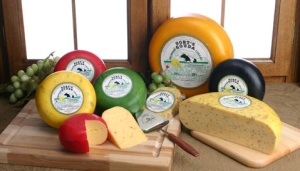As the number of people sick with E. coli O157:H7 linked to Gort’s Gouda Cheese Farm in Salmon Arm, British Columbia, climbs to 20 sick and one dead, an Edmonton Journal columnist writes that any suggestions of risk are an overreaction.
“In light of such a tragedy, it’s easy to panic, and to view cheese made from unpasteurized milk — which is legal to sell in Canada — with a jaundiced eye. Ban it! Bring on irradiation! This sort of fear-based attitude is a mistake.
“Foodborne pathogens exist. They are a fact of life — always have been, always will be. But to blame, or move to eliminate, an entire  food culture, in existence for thousands of years, stimulating both the palate and the economy, would be an overreaction.”
food culture, in existence for thousands of years, stimulating both the palate and the economy, would be an overreaction.”
Kevin Allen, a microbiologist at the University of British Columbia and aging hockey player, had some sensible comments, such as, “We can’t keep saying that, historically, there is a 60-day aging period. It’s not necessarily based on E. coli O157, which we didn’t recognize as a foodborne pathogen until 1982. … The longer the cheese is aged, the more inactivation you will have. But it’s hard to put an exact (time) on that. We don’t have the data.”
One solution, says Allen, is to conduct research into how long it takes for a pathogen to be rendered inactive. Or he says you could just pasteurize the milk used in the cheese, a heating process which, properly done, kills pathogens.
Well, that sounds simple enough. Heat the bejezus out of the stuff, and eliminate the worry, the risk, right?
The owner of a cheese shop says, “Anyone working with raw milk products has safety systems and precautions, and a system of vigilance against the proliferation of bad bacteria … and that is regulated at a federal and provincial level.”
And so are the bacteria-seeing goggles.
As usual, the Public Health Agency of Canada provides completely irrelevant information to this outbreak, and wants “to remind Canadians to follow proper hygiene and safe food handling and preparation practices to prevent the spread of all food-borne illness including E. coli. For example:
Wash your hands before and after cooking;
Keep knives, counters and cutting boards clean;
Keep raw meats separate from other foods when you store them; and
Refrigerate or freeze left-overs promptly.”
